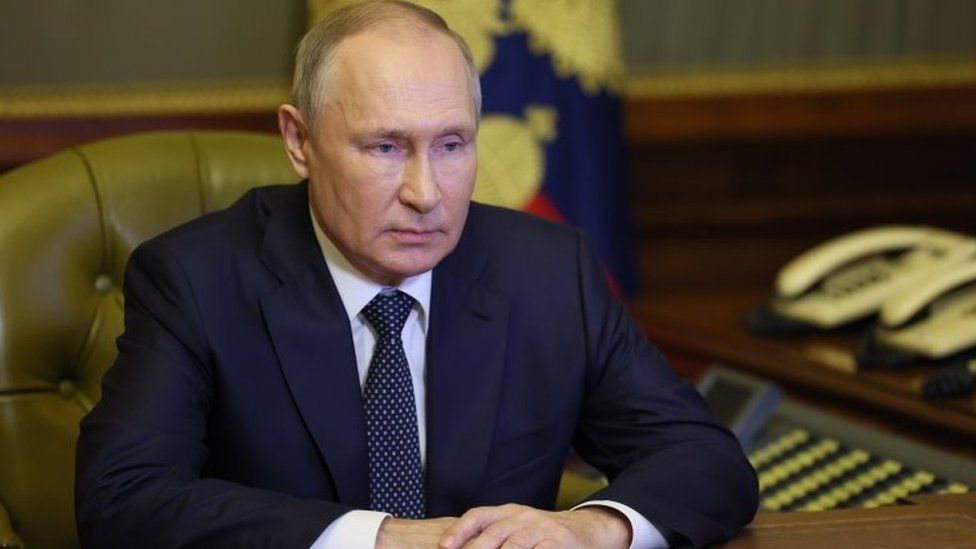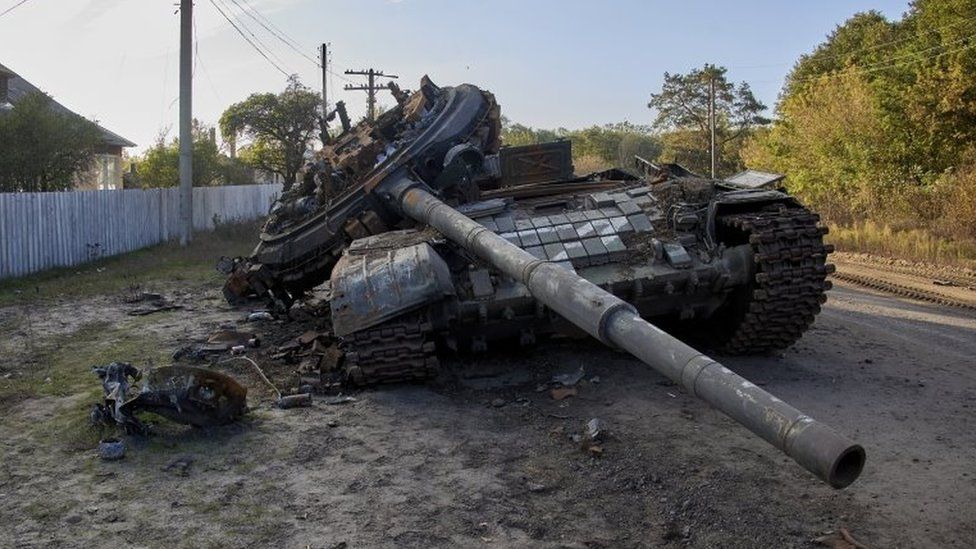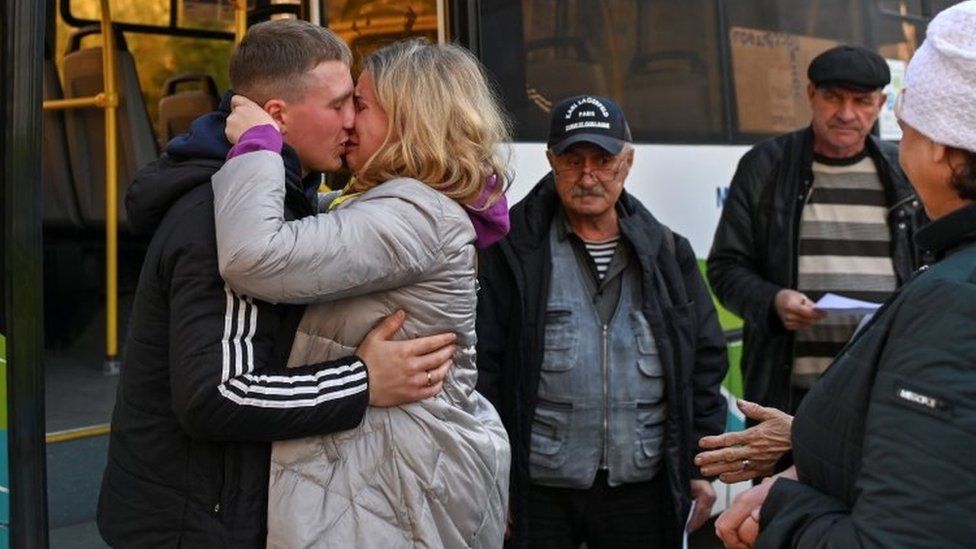Getting in his mind is a thankless task – but we should try, writes the BBC’s Steve Rosenberg.
 Image source, EPA
Image source, EPAIt’s the question we’ve been asking for months now, even before Russia invaded Ukraine.
What is Vladimir Putin thinking and planning?
Let me get the disclaimer in early. I have no Kremlin crystal ball. Neither do I have Putin on direct dial.
Former US President George W Bush once said he’d looked Vladimir Putin in the eye and “got a sense of his soul”. Look how well that ended for relations between Russia and the West.
So, getting inside the mind of the Kremlin leader is a pretty thankless task. But it’s important to try. Perhaps more than ever now, in light of recent nuclear sabre-rattling by Moscow.

There’s little doubt that the Russian president is under pressure. His so-called “special military operation” in Ukraine has gone badly wrong for him.
It was supposed to last a few days. But we’re nearly eight months in and there’s no end in sight.
The Kremlin admits “significant” troop losses; in recent weeks the Russian military has been losing territory in Ukraine which it had previously occupied.
To boost troop numbers, last month President Putin declared partial mobilisation, something he’d insisted he wouldn’t do. Meanwhile, sanctions continue to degrade the Russian economy.
So, back to Putin’s state of mind. Will he be thinking he got it all wrong, that his decision to invade was a fundamental error?
Don’t assume so.
“Putin’s perceptions drive the entire situation in this conflict,” believes Konstantin Remchukov, owner and editor-in-chief of the Russian newspaper Nezavisimaya Gazeta.
“He is the authoritarian leader of a nuclear power. He’s the unchallenged leader in this country. He has some strong beliefs and perceptions which drive him crazy. He’s started to believe that this is existential from the point of view of importance. Not only for him. But for the future of Russia.”
If this conflict is existential, how far is President Putin prepared to go to win it?
In recent months senior Russian officials (including Putin himself) have been dropping unsubtle hints that the Kremlin leader would be prepared to use nuclear weapons in this conflict.
“I don’t think he will,” US President Joe Biden told CNN. “But I think that it’s irresponsible for him to talk about it.”

Image source, EPA
This week’s intense Russian bombardment of Ukraine suggests the Kremlin is, at the very least, determined to escalate things with Kyiv.
With the West, too?
“He’s trying to avoid direct confrontation with the West, but at the same time he’s prepared for it,” believes veteran liberal politician Grigory Yavlinsky. “I fear most the possibility of nuclear conflict. And, on the second place, I fear endless war”.
But “endless war” requires endless resources. That’s something Russia doesn’t seem to have. The wave of missile strikes on Ukrainian cities is a dramatic demonstration of force, but how long can Moscow sustain that?
“Could you continue this missile flow for days, weeks, months? Many experts doubt that we have enough missiles,” says Mr Remchukov.
“Also, from the military point of view, no-one has ever said what would be the sign of ultimate [Russian] victory? What is the symbol of victory? In 1945 it was the banner over Berlin. What is the criteria of success now? [A banner] over Kyiv? Over Kherson? Over Kharkiv? I don’t know. Nobody knows.”
It’s not even clear that Vladimir Putin knows.
Back in February, the Kremlin’s objective appears to have been the rapid defeat of Ukraine, forcing Russia’s neighbour back into Moscow’s orbit without a prolonged war. He miscalculated. He underestimated the determination of the Ukrainian army and people to defend their land, and seemingly overestimated the capabilities of his own military.
What’s he thinking now? Is Vladimir Putin’s current plan to cement control over Ukrainian territory he claims to have annexed and then freeze the conflict? Or is he determined to push on until the whole of Ukraine is back in the Kremlin’s sphere of influence?
This week former Russian president Dmitry Medvedev wrote: “The Ukrainian state in its current configuration… will be a constant, direct and clear threat to Russia. I believe the aim of our future actions should be the complete dismantling of Ukraine’s political regime.”
If Mr Medvedev’s words reflect President Putin’s thinking, expect a protracted and bloody conflict.

Image source, Reuters
But, inevitably, Mr Putin’s actions abroad are having consequences at home. Over years the Kremlin painstakingly cultivated Putin’s image of “Mr Stability”, encouraging the Russian public to believe that as long as he was in charge they would be safe.
That’s a hard sell now.
“The previous contract between Putin and society was that ‘I protect you’,” says Mr Remchukov.
“For many years the main slogan was ‘predictability’. What kind of predictability is there today? The concept is over. Nothing is predictable. My journalists don’t know whether they will receive call-up papers when they get home today.”
Vladimir Putin’s decision to invade Ukraine surprised many. But not Mr Yavlinsky.
“I think that [Putin] had been moving in that direction – year by year he was constructing the way to what we have now,” Mr Yavlinsky says.
“For example, destroying independent media. He started that in 2001. Destroying independent business. He started that in 2003. Then 2014 and what happened with Crimea and Donbas. You’d have to be blind not to see it.
“Russia’s problem is our system. A system was created here that created such a person [as Putin]. The question of the West’s role in creating this system is a very serious one.
“The problem is that this system didn’t create a society. There are a lot of very nice people in Russia. But there is no civil society. That’s why Russia can’t resist.”